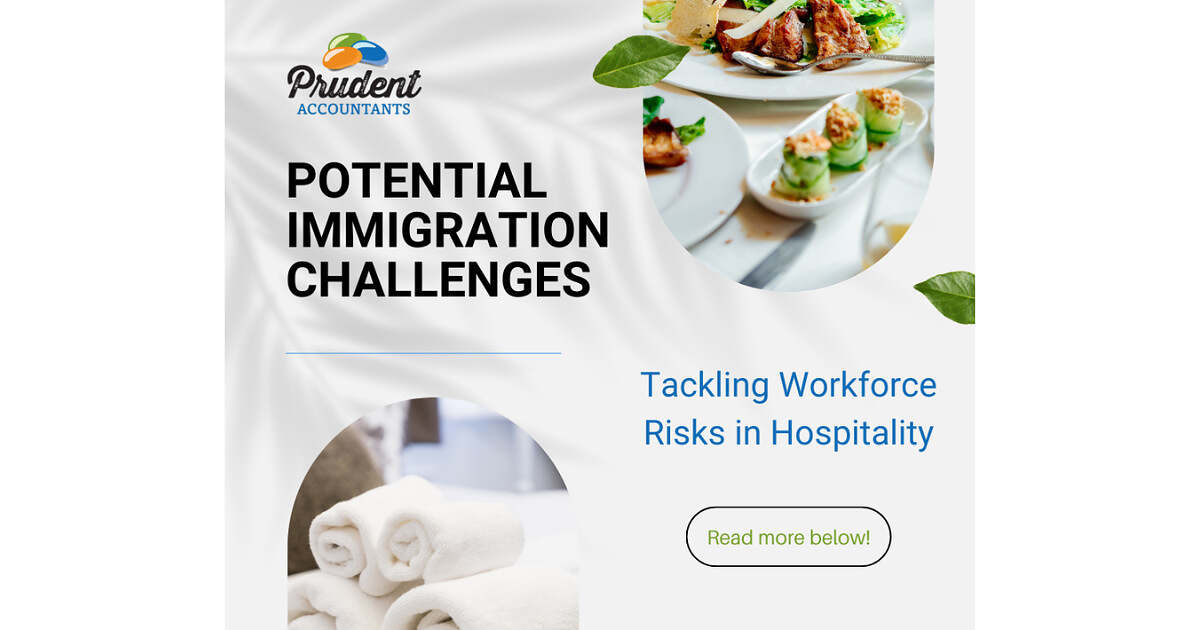Navigating Workforce Challenges in Restaurants and Hotels: A Guide to Mitigating Risks Amid Immigration Crackdowns

Restaurants and hotels heavily reliant on unauthorized workers face significant risks if an immigration crackdown occurs. Proactively addressing this issue requires a combination of HR, legal, and financial strategies to mitigate risks and plan for workforce stability. Here’s a comprehensive guide:
HR Steps
1. Workforce Audit
- Review employee records to ensure I-9 forms are complete and accurate.
- Verify the status of existing employees through E-Verify (if legally required or voluntarily adopted).
- Identify roles most likely filled by unauthorized workers and assess dependency levels.
2. Diversify Recruitment Sources
- Partner with local workforce development agencies, community colleges, and trade schools to attract authorized workers.
- Collaborate with refugee resettlement organizations or programs that provide work-authorized individuals.
- Recruit older workers, retirees, or underrepresented demographics in the workforce, like second-chance hires.
3. Offer Competitive Benefits
- Improve job attractiveness for authorized workers by offering better wages, flexible schedules, housing assistance, or childcare support.
4. Cross-Train Employees
- Train employees to take on multiple roles to improve flexibility and reduce dependency on a large workforce.
5. Build Workforce Resilience
- Create a pipeline of part-time or seasonal employees who can step in during staffing crises.
- Offer incentives for employee referrals of authorized workers.
Legal Steps
1. Consult Immigration Attorneys
- Seek legal guidance to understand compliance requirements, especially around I-9 verification and handling unauthorized workers.
- Prepare for potential audits by Immigration and Customs Enforcement (ICE).
2. Create a Contingency Plan for ICE Raids
- Establish a protocol for responding to workplace audits or raids, including a communication plan for employees and legal representation.
3. Avoid Illegal Retaliation
- If unauthorized workers are identified, ensure termination or role adjustment complies with labor laws to avoid lawsuits.
4. Avoid Overreliance on Cash Payments
- Review payroll practices to ensure compliance with federal and state laws, as paying workers off the books poses additional legal risks.
5. Engage with Policy Advocacy
- Join industry groups lobbying for immigration reform or guest worker programs, which may provide long-term solutions.
Financial Steps
1. Invest in Automation
- Use automation to offset potential labor shortages, such as self-ordering kiosks, robotic food prep, or housekeeping equipment.
- Evaluate upfront costs against long-term savings and operational efficiency.
2. Budget for Higher Labor Costs
- Anticipate increased costs due to hiring authorized workers at higher wages. Build this into financial forecasts and adjust pricing accordingly.
- Consider raising prices strategically to reflect quality service and cover increased costs.
3. Establish Financial Reserves
- Create a financial buffer to manage disruptions caused by workforce turnover, training new employees, or temporary shutdowns.
4. Diversify Revenue Streams
- Explore alternative revenue models, such as catering, takeout, or subscription meal services, which may require fewer labor-intensive operations.
5. Prepare for Payroll Transition
- Shift payroll to electronic systems to ensure full compliance and transparency. This also attracts more authorized workers who expect such standards.
Proactive Steps to Navigate a Crackdown
1. Scenario Planning
- Simulate workforce loss scenarios and develop operational strategies to maintain services with reduced staffing.
2. Strengthen Relationships with Authorized Workers
- Offer loyalty bonuses or retention incentives to current authorized employees to reduce turnover.
3. Develop Employee Sponsorship Programs
- Explore opportunities to sponsor work visas (e.g., H-2B for seasonal workers) for critical roles.
4. Community Engagement
- Build goodwill by supporting local community programs and training initiatives, enhancing your business reputation as an employer of choice.
5. Vendor Partnerships
- Establish partnerships with temp agencies or staffing firms that specialize in work-authorized labor.
Conclusion
Proactive planning is critical to minimize the impact of a potential immigration crackdown. By diversifying recruitment, improving compliance, automating operations, and preparing financially, restaurants and hotels can build resilience to weather the challenges ahead. While short-term costs may rise, these steps will ensure long-term sustainability and compliance.
Recent Post
View all Post
Many small business owners pay for business expenses out of their own pocket—because it’s faster, easier,…
You finally caught a break—your lender forgave part (or all) of your business debt. But now…
Recent changes to U.S. trade policy are once again shifting the financial ground for small businesses—especially…
When you hear “research and development tax credit,” you might picture scientists in lab coats or…
Homeowners across Minnesota have long aired frustrations over aggressive homeowners association (HOA) boards—associations levying arbitrary fines,…
For many small business owners and self-employed professionals, tax season may feel like it ends in…








